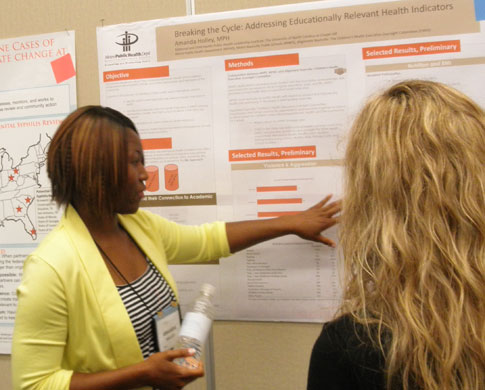Maternal and child health leadership institute offers essential leadership training
August 24, 2014
Effective leadership is crucial to successful public health infrastructure, as professionals enrolled in the Gillings School of Global Public Health’s Maternal and Child Health Public Health Leadership Institute have discovered.
The institute, a year-long, intensive senior-level training program funded through the U.S. Maternal and Child Health Bureau, recently has completed its first two cohorts and found that participants were able to increase skill levels in 20 target areas. Results, “Moving the Needle: A Retrospective Pre- and Post-analysis of Improving Perceived Abilities Across 20 Leadership Skills,” were published online Aug. 1 in Springer Science + Business Media’s Maternal and Child Health Journal.
Claudia S.P. Fernandez, DrPH, lead author on the paper and clinical assistant professor of maternal and child health at the Gillings School, found that institute participants reported that their skills had improved significantly through the intensive method of leadership training used in the program.
Assisting Fernandez were Elizabeth Jensen, PhD, an instructor in the UNC School of Medicine; David Steffen, DrPH, clinical assistant professor in the Public Health Leadership Program at the Gillings School; and Gillings School maternal and child health master’s student Cheryl C. Noble.
Institute focus was on enhancing three core skills – in individual, organizational and system-level leadership – within the maternal and child health field. Targeted leadership skills included communication, negotiation, conflict management and innovation. The core skills were chosen because they are recognized as important for leaders and are used in other national senior leadership development programs. The authors investigated whether the focus skills were right for maternal and child health leaders.

Amanda Holley, a fellow in the 2013-2014 National Maternal and Child Health Public Health Leadership Institute, directed by Dr. Claudia Fernandez, discusses her findings on a leadership project with other cohort fellows.
The institute used training opportunities by way of a residential retreat program and a distance-based continuous-learning system. Included were personal executive coaching, online tutorials, program readings, webinars and conference calls, among other formats. The curriculum was customizable, and on average, 24 webinars and other synchronized events were offered during the year.
The report findings suggest that greater confidence and self-efficacy in leadership abilities can lead to increased leadership effectiveness in real-world settings. Institute fellows reported greater confidence in their leadership abilities that will translate into more effective leadership in their home agencies, communities and profession.
Participants were chosen through a competitive application process. They were primarily women working at the mid- to senior levels in maternal and child health organizations, including state and county government. Those who completed the program answered self-administered pre- and post-questionnaires.
The intensive method of leadership training used in the Maternal and Child Health Public Health Leadership Institute program was broadly effective in building targeted leadership skills as participants identified personal skills. Further research could determine how improved skill levels translate into more effective leadership in home agencies.

